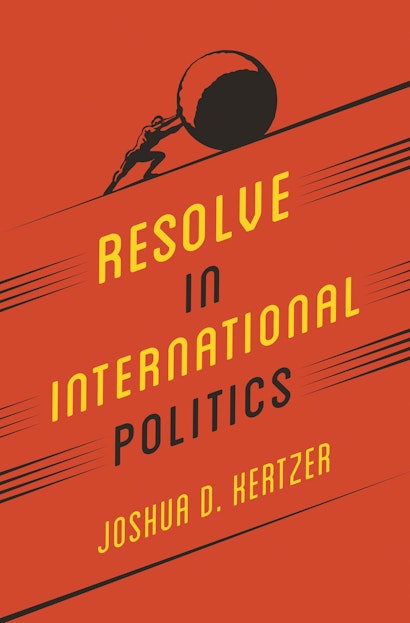Why do some leaders and segments of the public display remarkable persistence in confrontations in international politics, while others cut and run? The answer given by policymakers, pundits, and political scientists usually relates to issues of resolve. Yet, though we rely on resolve to explain almost every phenomenon in international politics—from prevailing at the bargaining table to winning on the battlefield—we don’t understand what it is, how it works, or where it comes from. Resolve in International Politics draws on a growing body of research in psychology and behavioral economics to explore the foundations of this important idea.
Joshua Kertzer argues that political will is more than just a metaphor or figure of speech: the same traits social scientists and decision-making scholars use to comprehend willpower in our daily lives also shape how we respond to the costs of war and conflict. Combining laboratory and survey experiments with studies of great power military interventions in the postwar era from 1946 to 2003, Kertzer shows how time and risk preferences, honor orientation, and self-control help explain the ways leaders and members of the public define the situations they face and weigh the trade-offs between the costs of fighting and the costs of backing down.
Offering a novel in-depth look at how willpower functions in international relations, Resolve in International Politics has critical implications for understanding political psychology, public opinion about foreign policy, leaders in military interventions, and international security.
Awards and Recognition
- Co-Winner of the 2017 Alexander L. George Book Award, International Society of Political Psychology
Joshua D. Kertzer is assistant professor of government at Harvard University.
"[A] marvelous book. . . . After perusing this erudite and tightly argued book . . . every reader will agree that resolve matters."—Choice
"Important and impressive. . . . Kertzer's theoretically innovative and methodologically sophisticated book greatly improves our understanding of the crucial but underexplored concept of resolve. It is likely to be very influential in the field of international security and should be on the reading list of all scholars who study conflict bargaining, as well as those who take a behavioral approach."—Roseanne W. McManus, Perspectives on Politics
"Resolve is central to much international relations theorizing, but all too often is underanalyzed. Not in this book. Kertzer develops and tests the foundations of resolve by combining the characteristics of the actor and the situation. Using experiments and historical data, Resolve in International Politics moves us a big step forward."—Robert Jervis, Columbia University
"This pathbreaking book is the first systematic look at the causes and consequences of resolve in international politics. The scholarship is terrifically sound; the writing is flawless, colorful yet clear. It is the tip in the spear of a renaissance in the study of decision making in this discipline."—Brian Rathbun, University of Southern California
"While the concept of resolve is central to theories in the international security field, it has not been clearly defined. Ably integrating ideas from various areas, including psychology, journalism, and history, this engaging book makes a significant conceptual, theoretical, and methodological contribution to the role of resolve in international relations."—Deborah Welch Larson, University of California, Los Angeles
"It is rare for a book to reconceptualize a well-established idea, and yet, this is exactly what Kertzer has done in quite an innovative fashion. Clarifying the causes of resolve, he sets out new methodological innovations to examine thorny issues in ways that will resonate far beyond the idea of resolve alone. A tour de force, this rich and original book will become the seminal and definitive treatment of this topic."—Rose McDermott, Brown University

